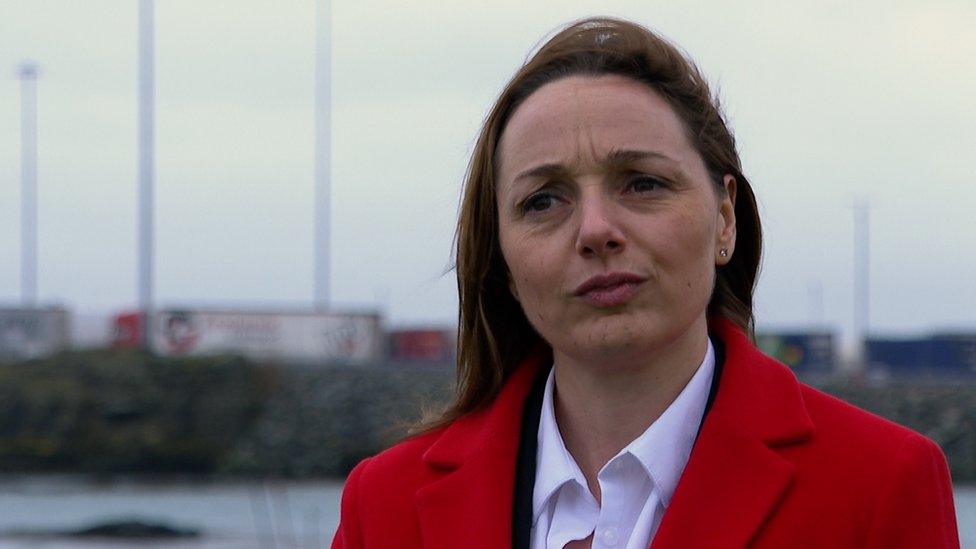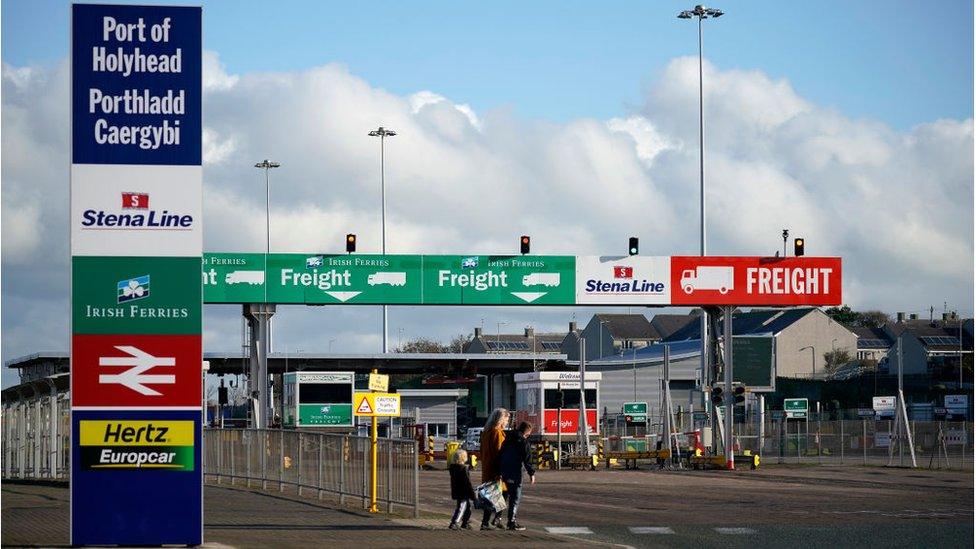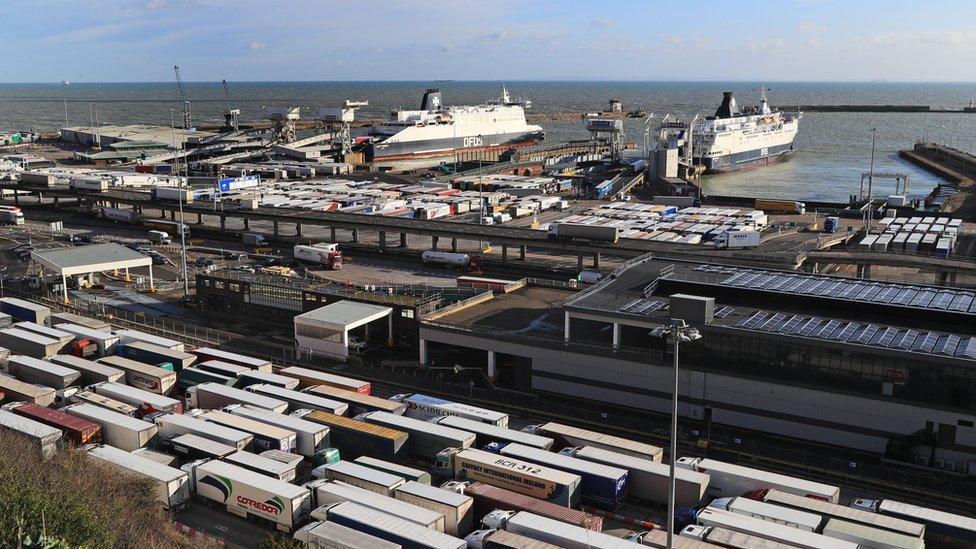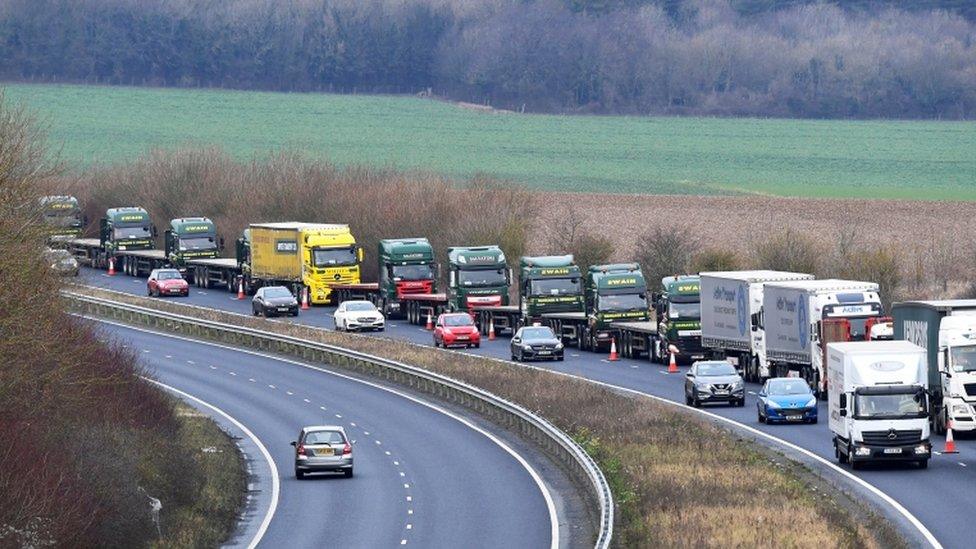Brexit: Hauliers fear 'mayhem' at Holyhead port
- Published
- comments
Testing is due to start in two weeks according to the port's owners
Hauliers have claimed there will be "mayhem" at Holyhead port when the Brexit transition period ends.
Holyhead is the second biggest "roll-on roll-off" port in the UK after Dover, carrying 1,200 lorries and trailers a day across the Irish Sea.
The Irish Road Haulage Association (IRHA) said the first six months of 2021 would be "terrible" as the port is not ready to cope with the change.
But the port's owner, Stena Line, has said the process would be smooth.
The IRHA remain unconvinced as the deadline to agree a new UK-EU deal approaches and the Brexit transition period ends on 31 December.
It is concerned border-ready pre-boarding IT systems have not been tested for outbound travel.
The European Union is planning to enforce border controls on the Irish side from 1 January but inbound lorries into Wales will not face any checks by UK authorities until July 2021.
"We're very concerned," said IRHA president Eugene Drennan.

Eugene Drennan claims there has been no transition
"After the deadline and UK 'Brexiting', the decisions still won't be made. They'll unfold as the problems appear.
"That leads to a certain degree of mayhem. You will have time delay, you'll have a lot of anxious moments.
"You'll have a lot of truck people getting a little hot under the collar. You'll have ferry times delayed and you'll have a general upset.
"Even though it's called a transition period, there has been no transition.
"It's a rush now these last few weeks to try and get systems together, to try and get things up and running and though the Irish side has a reasonable degree of preparedness done, some of it is very cumbersome.
"And none of it links up with Her Majesty systems. England and on that side, on the Holyhead side, they're not ready at all."

Ian Davies is confident everything will be ready in time despite the tight schedule
Ian Davies, Stena Line's head of UK Port Authorities, said he was confident despite "very, very tight" timescales.
He said: "We are live testing in the next two weeks. We're starting to educate our staff on the new checking processes.
"We have always planned on the worst case scenario of 'no deal' because that's the only thing you can base your preparations on and so we are now confident that we are in the right place for that.
"Trader preparation is a big question. That's been hanging over everyone, but I believe that most of the guys now are fully engaged in the process."
"There should be a clear flow through Holyhead port for inward goods from Ireland."
Stena Line confirmed the decision had been made to develop an inland custom checks facility away from Holyhead port.
It is believed those will be sites in Warrington and Birmingham.
Anglesey council leader Llinos Medi Huws, who is also a member of the North Wales Economic Ambition Board, has called for any checkpoint to be as close to Holyhead port as possible.
"The main concern we have is the impact that's going to have on the use of this port and the loss of jobs," she said.
"So the sooner we have any clarification on that we can make sure that the jobs here are safeguarded and that the people of Holyhead don't have to worry."

Llinos Medi Huws wants to see jobs protected on Anglesey
Dr Edward Jones, from Bangor Business School, added: "We seem to be getting the headache of Brexit here in that we could see parts of the island becoming a car park for the trucks, but we don't seem to be getting any of the benefits of those customs jobs. They seem to be going elsewhere."
There are fears that supply chains could be disrupted if documentation and congestion lead to delays and businesses decide to use alternative routes.
A new ferry route has been set up between France and Ireland.
Chris Yarsley from Logistics UK, which represents freight businesses, said the automotive manufacturing industry relies on vehicles delivering spare parts with hours to spare.
"Any break in that supply chain will cause manufacturing issues, therefore people will look to other places to source their goods and that could impact on the economic viability of the UK," he added.
A UK government spokesman said: "The government is working closely with the devolved administrations and ports, right across the United Kingdom, to plan for the end of the transition period and beyond.
"The delivery of IT systems necessary for the end of the transition period is on track."
- Published15 October 2020

- Published14 September 2020

- Published23 September 2020
